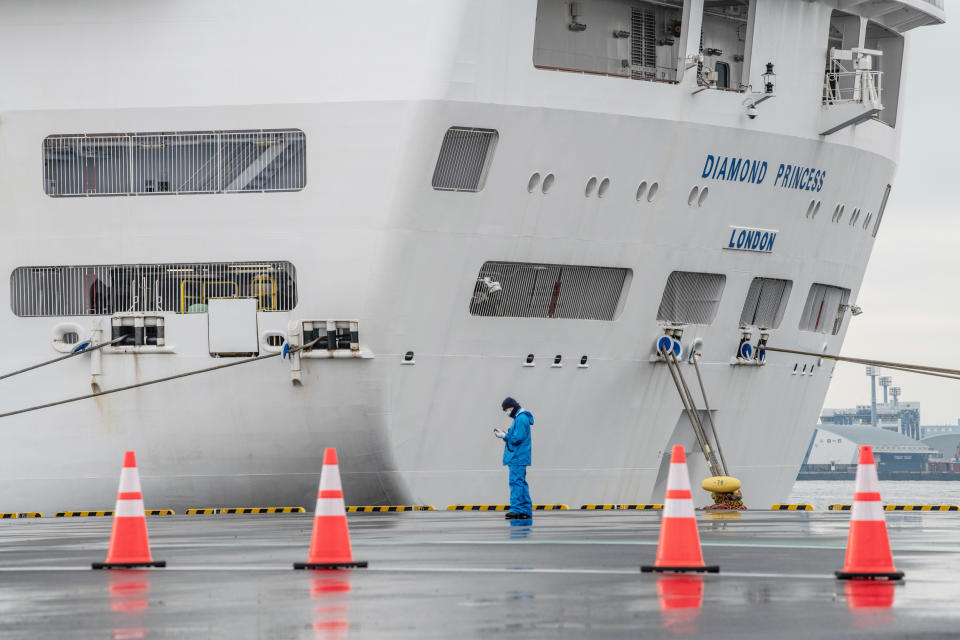Most cruise lines don't pay federal income tax — just one of the reasons they aren't getting a bailout
Cruise lines, which have been pummeled by the economic impact of the coronavirus, may not be eligible to receive relief through the bailout fund included in the $2 trillion stimulus bill passed on Friday.
While the stimulus bill allocates $500 billion for distressed businesses, in order to qualify, a company must be “created or organized in the United States or under the laws of the United States” and “have significant operations in and a majority of its employees based in the United States,” according to the new law.
Some of the country’s largest publicly traded cruise lines are incorporated offshore. Carnival Corporation, which owns the Princess cruise line, is incorporated in Panama. Royal Caribbean is incorporated in Liberia, and Norwegian Cruise Lines is incorporated in Bermuda.

“It doesn't sound like they'd be eligible for relief,” said Aaron Cutler, a partner with Hogan Lovells’ government relations and public affairs practice. The law firm represents some cruise line companies.
The Treasury Secretary would ordinarily have some discretion as to how to implement the relief, he said — but that might require “creative lawyering” at the Treasury Department, Cutler said.
“We did not ask nor expect a cash bailout from the U.S. government,” Carnival told NBC News. Norwegian Cruise Lines did not immediately respond to a request for comment, and Royal Caribbean pointed to its recent announcement that it would be taking a multibillion-dollar loan.
The cruise industry became a flashpoint in the coronavirus outbreak as hundreds of people became infected with the virus on their ships. Passengers on two Carnival cruise lines were quarantined for more than a week as health authorities attempted to contain a virus outbreak that emerged on the ship. The Grand Princess was forced to moor off the California coast after 21 people tested positive for the virus. Passengers on the company’s Diamond Princess were also quarantined in Japan after one passenger tested positive for the virus. Roughly 700 passengers on the ship became infected, and at least eight died.
Download the NBC News app for full coverage of the coronavirus outbreak
Cruise industry stocks have been crushed by the financial impact of the coronavirus. Carnival, Royal Caribbean, and Norwegian all suspended operations earlier this month as their stocks continued to take a dive. Carnival’s stock price has plummeted by about 72 percent from the beginning of the year. Royal Caribbean is down by 74 percent and Norwegian is down by 79 percent during the same time.
“The effects of the coronavirus outbreak on our business has been swift and severe,” Norwegian Cruise Line CEO Frank Del Rio told investors in February. “The continuous global headline news coverage has been substantial and relentless.”
Cruise line companies have few options to stabilize their businesses, aside from fully containing the virus, James Hardiman, a leisure and travel analyst with Wedbush Securities, told NBC News. The companies could access a debt bond offering from a traditional bank or follow Royal Caribbean’s example in taking out $2.2 billion in debt backed by its ships.
“The devil is going to be in the details here and we don’t know a lot of the details,” Hardiman said.
President Donald Trump has said his administration would help the industry, along with other travel industries such as hotels and airlines that have taken the brunt of the economic impact of the virus.
“We can’t let the cruise lines go out of business,” Trump said last week at a press briefing. “I mean, that would be massive numbers of jobs for our country and, actually, for the world.”
However, the idea of extending aid to cruise lines remains controversial. The three biggest cruise lines are incorporated in what are called equivalent exemption countries where they are not required to pay the 21 percent corporate income tax that U.S. companies are obligated to pay, said Robert Willens, a tax and accounting analyst.
“Why don’t they just relocate and domesticate and change the place of incorporation from Panama to the U.S. and this way they’ll be eligible for loans and loan guarantees?” he said. “If they did that, they would win the battle but lose the war because they would be forced to give up their tax exemption. I assure you that is sacrosanct; they're not giving up their tax exemption.”
For instance, Carnival, the biggest U.S. cruise line company, would have had to pay around $600 million in corporate taxes on its reported $3 billion in income for 2019.
With a potential loss in profit to taxes at these amounts, “they’re not moving to the U.S.,” Willens said.
A bailout for the industry has a swarm of critics in Washington, D.C. Earlier this month, Rep. Doris Matsui, D-Calif., called on the House Ways and Means Committee and the Committee on Transportation and Infrastructure to block a bailout of the industry.
“Unlike American families, corporations that operate foreign-flagged vessels do not pay taxes in the United States,” she wrote. “Additionally, pervasive safety and medical shortcomings on vessels have caused numerous Americans harm.”
The cruise line industry supports around 1.1 million jobs worldwide, with about 421,000 of those in America, according to the Cruise Line Industry Association.

